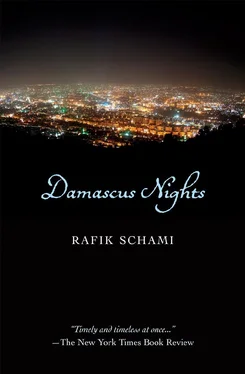The struggle with the mighty octopus was a long one. In winter we children would huddle in Salim's room, shivering with fear for the coachman who was battling the octopus with its countless suckers, and if it happened to thunder outside we would huddle even closer.
Tamim, one of the neighborhood children, had the obnoxious habit of grabbing me by the neck with his fat fingers in the middle of the story. That would scare me every time and I would scream. Then Salim the coachman would quickly reprimand the troublemaker, ask me where he had left off, and return to his battle with the giant octopus.
Afterward, every little rustle of fallen leaves would give us goose bumps, as if the octopus were lying in wait for us. Tamim, that chicken, who had acted so unimpressed while Salim was telling the story, was more afraid than anyone else. He lived a few houses down, you see, so he had to cross our courtyard and walk through a dark alley to get home. But three other children and myself lived in the same house as Salim, and we felt his reassuring nearness even at bedtime.
One night the octopus was especially ferocious. I was overjoyed to reach my bed safe and sound. Suddenly I heard Tamim's voice, whimpering softly at the old man's door: "Uncle Salim, are you still awake?"
"Who goes there? Tamim, my boy, what's the matter?"
"Uncle, I'm afraid. Somethings growling in the dark."
"Wait, my boy, just wait! I'm on my way. I only have to unsheathe my Yemenite dagger," reassured Salim through the closed door.
Tamim waited, ashamed, since all of us who lived nearby were laughing out loud.
"Keep one step behind me, and, even if a tiger jumps us, don't be afraid — I'll hold him back," Salim whispered and brought Tamim to safety, even though the old coachman was half blind and could barely see in the dark. No one could tell lies as well as Salim.
Yes he loved to lie, although he had no patience for exaggeration. One day a neighbor had joined us and was happily listening to the story of the octopus and the Mexican fisherman. But then, right in the middle of the battle, he insisted on knowing how long the octopus's tentacles were.
Salim was startled by the question. "Very long. . with hundreds of suckers," he said somewhat confused.
"How long? One yard? Ten yards?" scoffed the neighbor.
"How should I know? I didn't go there to measure his arms. I had to get rid of the thing, not tailor it a suit," Salim snapped back, and we all laughed. The man kept mumbling something to himself while the coachman beat the octopus until it vomited its whole supply of ink and fled. But as soon as the battle was over — just when Salim was preparing to smoke his well-earned waterpipe on a sandy beach in Cuba— the man interrupted a second time: "So it was you who colored the oceans blue!"
"No, no, the oceans were blue long before I was born. Many brave souls fought with many octopi. The first one to do so lived three hundred and twenty-seven years before Adam and Eve," remarked the coachman unperturbed and gave his waterpipe a couple of pulls. Then he returned to the coast of Cuba to recuperate.
I once asked Salim how it was that his words could put people in such a spell, and he said, "It's a gift from the desert," and since I didn't understand what he meant, he explained: "The desert, my friend, seems beautiful to strangers at first. People who only visit it for a few days, a few weeks, a few months, find it enchanting, but in the long run life in the desert is tough. It's hard to find anything beautiful in the scorching heat of day or the screeching cold of night. That's why no one really wanted to live there, and so for a long time the desert was very lonely. It cried out, but the caravans just passed on by, happy to escape the barren wilderness unharmed. Until one day my great-great-great-grandfather, who was also named Salim, was crossing the Sahara with his tribe. He heard its cries for help and decided to remain, so as not to leave the desert all alone. Many laughed at him for giving up the green gardens of the city to seek his fortune in the sands. But my great-great-great-grandfather stayed true to the desert. His whole life long he believed that paradise was simply loneliness that had been overcome. From then on, his children, and his children's children, drove away the desert's loneliness with their laughter and games, and with their dreams. The hooves of my great-great-great-grandfather's horses drummed the desert's limbs awake, and the soft gait of his camels brought it rest. In gratitude the desert gave to him, and to all his children, and his children's children, the most beautiful colors in the world: the secret paint of words, so that they could tell each other stories by campfire light and on their endless journeys. And so my ancestors made sand into mountains and waterfalls, into ancient forests and into snow. By the campfire, in the middle of the desert, almost dead from hunger and thirst, they told stories of a paradise flowing with milk and honey. And they took their paradise along on all their travels. Their magic words made every mountain and valley, every planet and every world lighter than a feather."
In over forty years Salim never drove his carriage beyond Beirut, but on the wings of his words he traveled the globe like no one else.
So when it happened that he of all people suddenly lost his voice,
the whole neighborhood was bewildered.
Not even his best friends
could believe
it.
2 Why a strange disquiet interrupted the hitherto quiet comings and goings of seven gentlemen
If Salim had listened to his father he would have become a happy merchant or craftsman like each of his five brothers, but he was determined at all costs to be a coachman. In those days the profession had a very bad reputation: coachmen were generally considered no better than rowdy drunkards. Nevertheless Salim took an unusual pride in his vocation.
Apart from his gifts as a storyteller — a profession that enjoyed a better, if blander reputation than coachman — Salim was favored with yet another talent: he could make wounded swallows fly again, and this, indeed, was no mean feat. Salim's neighbors were puzzled by his relations with the swallows, and they quarreled among themselves over the source of his gift. Some proclaimed that his hands were blessed; others accused him behind his back of some sort of wizardry. It was this magic, they concluded quietly and not without some fear, that enabled Salim, and Salim only, to restore flight to any swallow. Most adults, however, thought the whole thing a swindle.
Those glorious gliders, whose graceful flights adorned the sky above Damascus, nested underneath our roofs. Time and again we would find a swallow that had somehow fallen out of its nest flapping helplessly on the ground. And of course it's a well-known fact that swallows refuse all nourishment so long as they cannot fly. Had it not been for Salim the coachman they would have died of hunger. We children would carry the swallows to him — and, as I said, to him alone — and he would drop everything, take the quivering bird into his large hands, and walk out onto the balcony. What he whispered to the bird there, and why he kissed it, was his secret. No one else knew how. He gave back to the skies their best acrobats. The swallow would race away, sometimes thanking the old man with an elegant loop above his head.
People didn't know much about Salim. He seldom spoke about himself. And when he did, it was so much like one of his stories that no one really knew whether he, was talking about himself or one of his heroes. People frequently referred to Salim the coachman, but I bet most of them couldn't even tell you what his last name was. As a matter of fact, it was Bussard.
Читать дальше












